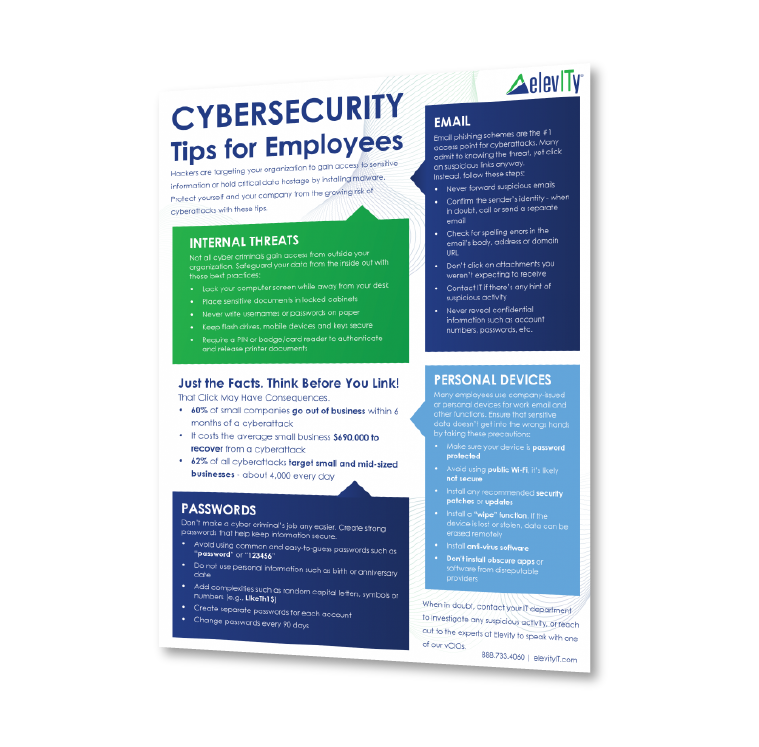Is your technology struggling to keep up with your business needs and the competition? Are you feeling like by the time you’ve figured out what technology you need, something new hascome on the market, making it outdated or obsolete?
That’s the case for many small and mid-sized business that don’t have a dedicated chief information officer (CIO) to oversee their technology. The problem is, many companies can’t afford to hire such a position.
A Dedicated vCIO — A Better Strategy
A growing number of businesses are enlisting the help of a Managed IT partner that brings with it a virtual chief information officer (vCIO). A vCIO is a dedicated IT expert who works closely with you to address cybersecurity, Cloud computing, business processes, big data analytics, software integration, strategic initiatives and other technology needs (for much less than hiring an executive position). In many respects, a vCIO brings greater benefits than hiring a staff member because a vCIO represents a team of vCIOs who have diverse backgrounds in many industries and can bring greater perspectives.
Before you hire a vCIO or sign a contract for Managed IT, however, you’ll want to weigh the pros and cons and make sure you get answers to the following questions.
1. What sets your company and your vCIOs apart?
Many Managed IT providers may be able to install equipment and software, but lack the people to reliably service it or provide the strategic direction you need. Others may have the personnel, but offer sub-par products. Ideally, your provider will offer the best of both worlds — robust technology along with a dedicated, qualified and experienced vCIO who has a partnership mindset to get the job done right.
2. What does onboarding look like?
You’ll want to fully understand how your Managed IT program will be implemented, and your vCIO should work with you to assess your existing IT landscape and create a technology roadmap that outlines each step along the way. That last thing you want is to feel left in the dark, so insist on transparency and open communication.
3. How can a vCIO help my business grow?
The right vCIO will do more than address your technology needs today; he or she will sit down with you to talk about where you want your business to be in the next year, five years and beyond. Then, together you can plan and strategize what role technology can play in helping you get there. A dedicated vCIO will bring clarity and help you focus on your business needs first, offering a balance between the technology you want (the latest gadget or gizmo) and the technology you actually need.
4. What kind of support can I expect if something goes wrong?
Some providers commonly have their vCIOs wear two hats — support and consulting, which can leave one or the other lacking. An effective vCIO will be the critical thinker behind how technology aligns with your business strategy and focus on your needs.
There should be an entire team of IT experts working with your vCIO to address issues quickly and take care of day-to-day operations. Additionally, a Managed IT partner should provide round-the-clock remote monitoring 365 days a year to proactively address any security issues and watch for software updates. Those updates often can be installed remotely. You should also expect to have a 24/7 help desk that can be accessed via live chat or by phone. Look for a Managed IT partner that offers a dedicated vCIO that can strategize with you and focus on your business needs, yet has an experienced team at his or her disposal to offer support at a moment’s notice.
5. How can a vCIO help secure our data?
As more and more data is moved to the Cloud, cybersecurity becomes increasingly important, and a vCIO and Managed IT team can ensure that proper firewalls, security patches, protocols and backup systems are in place and operating properly. Just as important, however, is ensuring that any data stored on servers and computers located on-premise remains secure as well. Security isn’t one-size-fits-all, so make sure your vCIO tailors a strategy for your unique business needs.
6. How do you keep up with new technology?
Just as your company may invest in its employees by providing continuing education, so too should your Managed IT provider. Because technology is a rapidly expanding industry, you’ll want to ask how your provider ensures that its vCIOs, service technicians and support staff keep up with emerging trends, innovations and the latest security threats.
7. What if my needs change?
With the right technology, you’ll be better equipped to grow your business. When that happens, you may need additional hardware, software or consulting than you did when you first partnered with your vCIO and Managed IT partner. An exceptional provider will not only adjust and adapt as your needs change; they’ll help you anticipate those changes and make recommendations along the way, along with an idea of any additional costs. The right partner will also have the resources needed to provide scalable, dynamic solutions including support resources and technology itself, (e.g., HaaS). A provider that has deep resources will strengthen their ability to truly support you.
Of course, there will be additional questions to address circumstances unique to your business. Gather them, along with these, and reach out to the Troyka-TC for an honest discussion and evaluation of your technology landscape. Meanwhile, check out the infographic below to further explain the benefits of a vCIO.








%20cropped.jpg)




